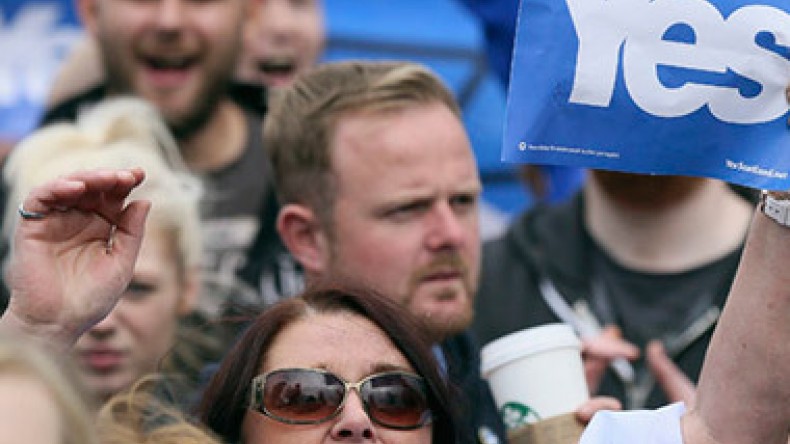
'Clear split: Scottish support “YES” campaign, UK media “NO” movement’
The major broadcasters largely support the “NO” campaign when most of the Scottish population in social networks are favoring the “YES” movement, Professor John Robertson, from the University of the West of Scotland, told RT.
RT: Your conclusion is that the major broadcasters are favoring the “NO” campaign. Could you briefly explain to us how you came to that view? Do you think the accusations over Nick Robinson's report for the BBC could affect the public mood?
John Robertson: I find fairly more bias against the “YES” campaign than in favor of the “NO” campaign. I am not surprised: the BBC is a national broadcaster and has a vested interest in a British state. But latterly things have become more serious. The Nick Robinson case is in danger of becoming a cause célèbre and causing people to focus entirely on that. It is important to remember that in the evening broadcasting in which Nick Robinson did tell lies, there were many other examples of imbalance heavily balanced in favor of the “NO” campaign. That is the important point. Many commentators, now including independent writers in English newspapers like The Guardian and so on, have described the BBC as being in full propaganda mode comparable to that of 2003 when the BBC followed the Blair administration`s line to tell lies about the reasons for attacking Iraq. It is beyond bias.
RT: There are just three days to go before the historic vote - can any coverage actually influence the outcome at this stage?
JR: I think the Westminster administration in London is in full panic mode because of the opinion poll suggesting that there may be a “YES” vote. And I think, rather late in the day, they have realized they were overconfident, and have now moved to try and remedy the situation. But I think it may be too late because the electors in Scotland see a panic in their behavior. This is self-inflected wound by David Cameron. At the Edinburgh agreement two years ago the Scottish side wished to have an alternative choice on the ballot paper and that would be “devo-max” which would be not full independence but enhanced independence. David Cameron's administration was so confident they would win that they wouldn`t have to give anymore. So they insisted on all or nothing and shot themselves in the foot rather badly. Either way, even if there is a close victory for “NO” that will be in the end very destabilizing for Britain.
RT: Why do you think the “YES” campaign is not getting enough media attention?
JR: It is very clear split; it is very fortuitous that social media have become as prevalent as half the Scottish population is on Facebook. The activity online and social media is very heavily dominated by the “YES” campaign. Perhaps in part because the mainstream media have largely supported the “NO” campaign. It is very shabby stage. And the BBC in the last few days have in almost an ashamed way increased the bias in favor of the “NO” campaign. But social media may tilt this. In something comparable to the Arab Spring but rather more successful than the Arab Spring. The Scottish population is highly educated with the most graduates of any country in Europe, and I think that the intellectual activity across a wide grassroots movement on the internet may tilt this despite the media bias.
Newsfeed
Videos






























